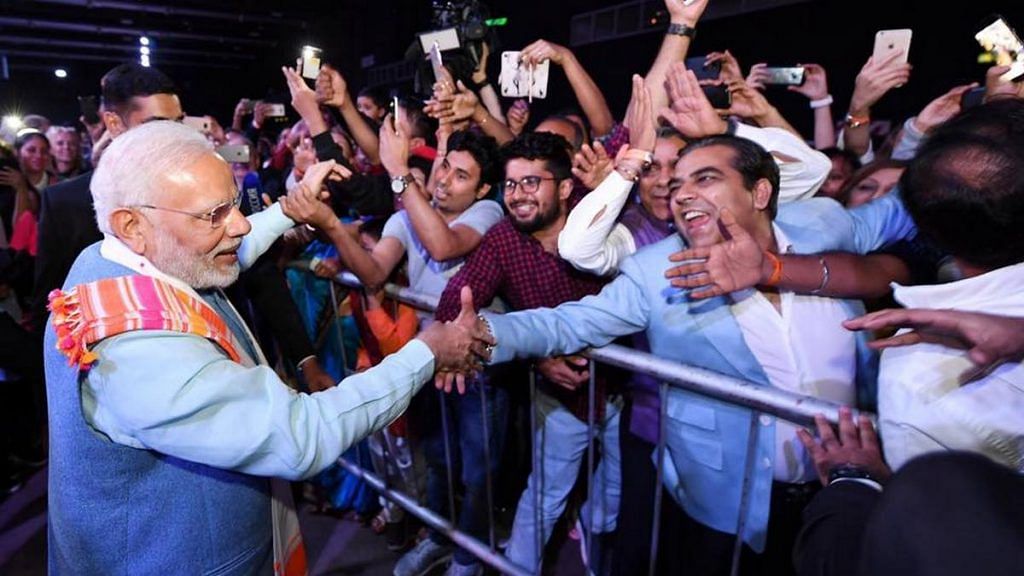Liberals get understandably upset with liberal-bashing. They rightly point out that all Left-liberals can’t be painted with the same brush.
You can’t say liberals are disconnected Khan Market elites because there are liberals in states and small towns too, you know. You can’t say liberals are all pro-Congress because you can find many staunch Congress critics among left-Liberals.
Sometimes, the shoe is on the other foot. Many liberals are guilty of doing the same to Modi voters, painting them all with the same brush. Since Modi’s second Lok Sabha election victory, many liberals can be heard saying that all Modi voters are ‘bigoted’. We’re told that each of the 22 crore-odd people who voted for the BJP believes in hardline Hindutva.
According to this line of thinking, Modi’s election victories have nothing to do with the opposition not having a credible face, or Modi’s welfare schemes, or his oratory and political charisma. It’s just religious majoritarianism. All these 22 crore voters are described as ‘bigoted’.
Also read: Under Modi, a resurgent middle India is coming to smash the Left-liberals’ ivory bunkers
Dear liberals, let’s face it. We cannot elect a new people. The people of India are what they are. Demonising and othering them is not going to take you anywhere. Whether or not it’s Hindutva that makes them vote for Modi, you are going to have to work with the same people, engage with them, talk to them, understand them.
We don’t even start doing so when we ridicule them as the gullible masses in the thrall of an emotional, violent majoritarianism. The sentiment, according to many of our liberals, is so strong that these unwise, ‘uneducated’ masses don’t even know what’s best for their economic interests. The people are so foolish, according to some liberals, that they’d rather sleep hungry and live without jobs but demand Hindu Rashtra first.
If that is the case, why did the BJP lose Rajasthan, Madhya Pradesh and Chhattisgarh assembly elections just a few months before the Lok Sabha polls? Why did the voters of these states go from ‘communal’ to ‘secular’ and back to being ‘communal’?
Why did the voters of Delhi give the BJP all seven Lok Sabha seats in 2014 and then give 67 of the 70 assembly seats to the Aam Aadmi Party in 2015? (A section of the Left still sees the AAP as a part of the Sangh conspiracy but never mind.)
Also read: Three things Indian liberals held dear were tested this Lok Sabha election
If Hindutva is the be-all and end-all of the voters’ concern, why did the Congress do well in Karnataka’s civic polls just days after being routed in the Lok Sabha? And why was Hindutva not enough to see the BJP get a clear majority in the Karnataka assembly election?
How come the voters of Bihar chose Modi in 2014 but Nitish Kumar-Lalu Yadav in 2015? Ah, did you say caste arithmetic of Lalu and Nitish? Well then, why did voters in UP just reject the caste arithmetic of Mayawati and Akhilesh and allegedly chose Hindutva instead?
The truth of the matter is that Hindutva is only one element of the BJP’s success and appeal. And that appeal has always been around. The BJP was not propelled into power immediately after the Babri Masjid demolition. Vajpayee lost 2004 just two years after the Gujarat pogrom. Advani ran a national security campaign in 2009, accusing the Congress of Muslim appeasement for the alleged delay in hanging Afzal Guru, and yet lost badly to Manmohan Singh.
Moditva bigger than Hindutva
It’s not Hindutva but the persona of Narendra Modi that is behind the BJP’s success. It is similar to the way people had developed faith and trust in Indira Gandhi, or the way people in Bengal trusted Jyoti Basu or how Odisha trusts Naveen Patnaik even today. The stark difference between state elections and the general election shows you Narendra Modi’s incredible popularity.
This trust and faith in Modi are not because of Hindutva. For some, it may even be despite Hindutva. Some voters give general assent to Hindutva because of the way it is sold to them. What’s wrong in talking about the interests of Hindus, they argue.
But people also like Modi for his oratory, his strongman image, his way of governing with public approval. Above all, Modi voters like Modi because they abhor the alternative, Rahul Gandhi, though not necessarily the Congress.
Also read: Indian liberals want to support everything Muslim, but that’s not the way to equal rights
Many Left-liberals have easy keywords to explain Modi: fascism, majoritarianism, demagoguery, muscular nationalism, xenophobia, Islamophobia and so on. Any enquiry beyond the limited dictionary is dangerous. It could reveal more about our liberals than about the masses. It could reveal how disconnected our liberals are from the masses, unwilling and unable to engage with them culturally and socially, or through religion or nationalism or any other ideology.
This disconnect is reflected as much among our liberals as it is among the political parties they favour. “It’s a terrible feeling to discover that your country is full of strangers,” wrote one such liberal commentator. He doesn’t realise the joke is on him.
Views are personal.
